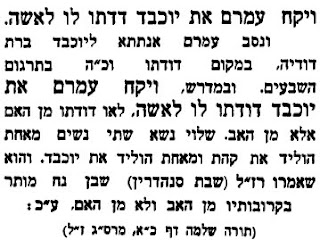Summary: An alternative way of translating dodato, from Rav Saadia Gaon and in the Septuagint, which eliminates a strong chronological difficulty in Yocheved and Moshe's birth.
Post: From the collected commentary of Saadia Gaon, we have the following:
That is, rather than translating dodato as "his aunt", he says that it means "the daughter of his uncle". This would then make Yocheved Amram's first cousin. And this is a way of solving a problem of how Amram could have married an aunt, which is against the Torah. And indeed, a midrash proposes an alternative solution, by which she would be an aunt from the father's side, but not the mother's side. That is, Levi married two wives; from one he had Kehat and from the other Yocheved.
Dod is plausibly one of those words which can take a range of related meaning, just like choten, and so this can work out.
The Septuagint also translates the word in an identical way:
20 καὶ ἔλαβεν Αμβραμ τὴν Ιωχαβεδ θυγατέρα τοῦ ἀδελφοῦ τοῦ πατρὸς αὐτοῦ ἑαυτῷ εἰς γυναῖκα καὶ ἐγέννησεν αὐτῷ τόν τε Ααρων καὶ Μωυσῆν καὶ Μαριαμ τὴν ἀδελφὴν αὐτῶν τὰ δὲ ἔτη τῆς ζωῆς Αμβραμ ἑκατὸν τριάκοντα δύο ἔτη
θυγατέρα τοῦ ἀδελφοῦ means daughter of the brother. We see it as well as the translation of Bereishit 24:48: לָקַחַת אֶת-בַּת-אֲחִי אֲדֹנִי לִבְנוֹ.
In his Tafsir, his translation of Torah, Rav Saadia Gaon takes a different approach, also apparently bothered by the violation of Biblical law:
Translated from Judeo-Arabic, this means that Amram took Yocheved his aunt as a wife "before it was prohibited". Thus, kodem matan Torah it was allowed, so do not object.
The translation of dodato as female first cousin does not only solve the "problem" of clash with the Sinaitic definition of incest. It also solves some major chronological difficulties. For if Yocheved is the daughter of Levi, then she is the first generation in Egypt. And Moshe, her son, redeemed them at the age of 80. If the span of exile in Egypt was 210 (rather that 400), then 210-80 = 130. And this, 130, is what the midrash puts Yocheved at, when she gives birth to Moshe, for she would be born as they enter Egypt. Ralbag and Ibn Ezra reject this as unnecessarily miraculous and certainly worth mentioning if it were so, but as others point out, any years one subtracts from Yocheved one needs to add to her father, Levi. We are caught between a rock and a hard place! Unless, of course, dodato does not mean Amram's aunt, who would be a daughter of Levi. Make her of Amram's generation, that is the second generation, and the chronological difficulties melt away.
This is a useful result, and fall-back position, but I would assert that peshat is that dodato indeed means his aunt. I'll cite Ibn Caspi for this, and then expand a bit on it with my own thinking.
On dodato, Ibn Caspi writes:
כ) ויקח עמרם את יוכבד דדתו, כבר קדם לנו בספר הזה
גם בספר הסוד תקון מלאכת השם בתורתו התמימה, כי אמר
למעלה בסתם במקום העיקר לתולדות משה וילך איש מבית לוי ויקח
את בת לוי (ב׳, א׳), ופה זכר הענין בפרוש:
Thus, this is to be treated as expansion and clarification of the bat Levi mentioned in the beginning of the second perek of Shemot. Bat Levi is thus the literal daughter of Levi, who is Amram's aunt.
Now, my expansion upon the point. Looking at each pasuk individually, in its immediate context, Bat Levi truly seems to mean a daughter of the tribe of Levi. The pasuk is:
| א וַיֵּלֶךְ אִישׁ, מִבֵּית לֵוִי; וַיִּקַּח, אֶת-בַּת-לֵוִי. | 1 And there went a man of the house of Levi, and took to wife a daughter of Levi. |
Throughout, no names are given, which is why an identification of a specific person in the actual daughter of Levi seems off. And the juxtaposition against a "man" from the house of Levi strongly suggests that it just means that this man took someone of his own tribe.
On the other hand, when considering the pasuk local to Vaera
| כ וַיִּקַּח עַמְרָם אֶת-יוֹכֶבֶד דֹּדָתוֹ, לוֹ לְאִשָּׁה, וַתֵּלֶד לוֹ, אֶת-אַהֲרֹן וְאֶת-מֹשֶׁה; וּשְׁנֵי חַיֵּי עַמְרָם, שֶׁבַע וּשְׁלֹשִׁים וּמְאַת שָׁנָה. | 20 And Amram took him Jochebed his father's sister to wife; and she bore him Aaron and Moses. And the years of the life of Amram were a hundred and thirty and seven years. |
the most common understanding of dodato is aunt. This might, however, be our own deficiency, due to lack of knowledge of Biblical Hebrew. Perhaps female first cousin fits the bill equally well. And we should not really consider later Sinaitic law as dispositive; nor should we worry about chronology -- I dislike considering chronology when deciding local peshat, because of all the calculations and constraints, all of which might be founded upon faulty assumptions. However, when we consider that this is a summary pasuk, and that the second perek already identified her as daughter of Levi -- yes, I know this is non-local -- then, the odds become rather strong that this pasuk is meant to be commentary on Bat Levi, interpreting it as aunt. So two interpretations are possible, where each local pasuk has a favored interpretation.


No comments:
Post a Comment